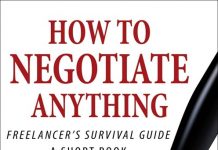 Most of the the time, The Passive Voice just excerpts and reposts interesting articles, but every so often Passive Guy adds commentary of his own. Recently, he had some interesting things to say about a story on Thought Catalog in which Porter Anderson discusses the pieces by Mike Shatzkin and Kristine Kathryn Rusch about rising e-book prices and slowing book sales.
Most of the the time, The Passive Voice just excerpts and reposts interesting articles, but every so often Passive Guy adds commentary of his own. Recently, he had some interesting things to say about a story on Thought Catalog in which Porter Anderson discusses the pieces by Mike Shatzkin and Kristine Kathryn Rusch about rising e-book prices and slowing book sales.
Passive Guy points out that the modern traditional publishing industry effectively exists to serve the needs of the biggest bestselling authors—the ones Mike Shatzkin noted hadn’t left those traditional publishers; the “big dog” that hadn’t barked yet. Even though traditional publishers and bookstores are slowly declining, the publishers will serve the needs of those bestselling authors to the very last.
Smart Big Dog authors (and most of them are smart) are often respected leaders in the world of tradpub, but they are not and will not be leaders in the disruptive change that is in process today. Big Dogs will be among the last to leave a publishing system designed to serve their specific wants and needs. The war will be decisively won by the time the Big Dogs move.
Hence, when the big dogs do bark, big publishing’s fat lady sings.
The Thought Catalog story seems to agree that a massive disruption is happening:
Imagine what would happen if self-manufacturers could flood the automobile market with hundreds of thousands of homemade cars that looked as good as Detroit’s models? That’s what’s happening in books. It’s a hobbyists’ heyday, and no market in any business that I can recall has experienced such a sudden and deep influx of amateur material, some of which, as Shatzkin says, “doesn’t look any different” from the professional wares.
Now I really am curious when some of those “big dogs” will finally start barking. But it’s probably going to take a while. Traditional publishers, as Passive Guy notes, are very good at taking care of their cash cows (can a big dog be a cash cow?), and a lot of those traditional authors are fully aware they might get more money by going independent but they simply don’t care—they have enough money, and they’d rather not have to bother with all the things a traditional publisher does for them.
But then, I don’t expect traditional publishers will die out entirely even if those big dogs start barking. There are plenty of smaller publishers who seem to be doing well enough, and they don’t have the huge overhead issues that are dogging the Big Five. If the Big Five should ever go under, I imagine a lot of those big dogs can simply move to smaller kennels.
































In somes the indie vs big publishing conflict reminds me adherence to political parties – each is a platform promoting its own interests and believes everybody would do better coming over to their side of the fence.
I don’t support indie or self-publishing because I can’t find enough books I want to read in its domain. A year or so ago I was determined to find something to read from Smashwords, but nothing sparked my interest. As I saw it, it was all low rent genre fiction. I’m not opposed to a low rent novel now and then, but as a main diet, no thanks.
Can indie publishing pull in books like Ravensbruck by Sarah Helm or The Dying Grass by William T. Vollmann? Maybe they’re not the Big Dogs, but big publishing supports them, so I support Big Publishing.